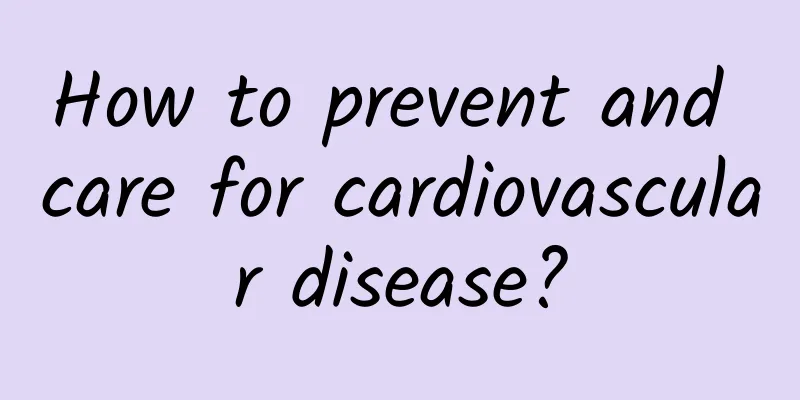How to prevent and care for cardiovascular disease?

|
Cardiovascular and cerebrovascular diseases refer to diseases of the heart and cerebrovascular vessels, also known as the "three highs" of "rich diseases", namely high blood pressure, high blood sugar and high blood lipids. Cardiovascular and cerebrovascular diseases are characterized by "high incidence, high disability rate, high mortality rate, high recurrence rate and many complications". According to statistics, there are more than 270 million patients with cardiovascular and cerebrovascular diseases in my country, and nearly 3 million people die from cardiovascular and cerebrovascular diseases each year, accounting for 51% of the total causes of death in my country each year. Therefore, we must attach importance to the prevention and control of cardiovascular and cerebrovascular diseases and adopt a healthy lifestyle. So how to prevent and care for cardiovascular diseases? Several common cardiovascular and cerebrovascular diseases: Coronary heart disease: Coronary heart disease refers to insufficient blood supply to the coronary arteries, often manifested as angina pectoris and myocardial infarction (interruption of blood supply to the heart muscle). Hypertension: Hypertension refers to a persistent increase in arterial pressure, which increases the burden on the heart and arteries, and increases the risk of cardiovascular and cerebrovascular events such as heart disease and stroke. Heart failure: Heart failure occurs when the heart is unable to pump blood effectively, resulting in the heart being unable to keep up with the body's demands. Common symptoms include shortness of breath, fatigue, and swelling. Stroke: A stroke is a sudden interruption or rupture of a blood vessel supplying the brain, resulting in damage or death of brain tissue. Common types include ischemic stroke and hemorrhagic stroke. Arrhythmia: Arrhythmia is abnormal electrical activity in the heart, causing the heart to beat at an irregular rate or rhythm. Common arrhythmias include atrial fibrillation and ventricular tachycardia. How to prevent and care for cardiovascular disease? For people with cardiovascular disease, proper care is very important and can help patients control symptoms, reduce complications, and improve quality of life. Healthy eating habits: Eating a balanced diet, reducing the intake of foods high in salt, fat, and sugar, and increasing the intake of vegetables, fruits, whole grains, and healthy fats can help maintain blood vessel health. Pay attention to weight management: Maintaining a proper weight is essential for cardiovascular health. Avoid obesity and control your weight through a proper diet and moderate exercise. Active exercise: 150 minutes of moderate-intensity aerobic exercise per week, such as brisk walking, jogging, cycling, etc., can improve the health of the cardiovascular system. In addition, strength training can also help strengthen muscles and bones. Quit smoking and limit alcohol consumption: Try to avoid smoking and excessive drinking. Smoking and excessive drinking are important risk factors for cardiovascular disease. Quitting smoking and limiting alcohol consumption can significantly reduce the risk of cardiovascular disease. Control blood pressure and blood lipids: It is very important to maintain normal blood pressure and blood lipid levels. Measure blood pressure and blood lipids regularly and manage and treat them as recommended by your doctor. Reduce stress: Being in a state of high stress for a long time may increase the risk of cardiovascular disease. By learning ways to cope with stress, such as relaxation techniques, meditation and exercise, you can reduce the impact of stress on cardiovascular health. Prevention of embolism: In cold winter, blood vessels (especially coronary arteries) are prone to contraction and spasm, which may lead to embolism due to insufficient blood supply. Patients should pay attention to keeping warm. In addition, regular physical examinations, especially physical examinations of cardiovascular health indicators (such as blood pressure, blood sugar, blood lipids, etc.), can detect risk factors and problems of cardiovascular disease early and take corresponding measures in time. In addition to the above precautions, you should also pay attention to avoid overwork, maintain good sleep quality, and avoid sitting or standing for long periods of time. Know the early signs of cardiovascular disease: Chest discomfort: Symptoms of chest discomfort usually occur after meals, before bedtime, and while walking. For example, you may feel chest tightness and cold sweats after eating; you may feel chest tightness and discomfort when sleeping; you may experience shortness of breath and rapid heartbeat when walking. These symptoms may be due to poor vascular function caused by cardiovascular and cerebrovascular diseases, which in turn leads to insufficient oxygen supply to the body. Radiating chest pain: Cardiovascular disease may cause heart pain, but in the early stages, this heart pain is generally mild and often presents as radiating chest pain, which may appear in the chest and back, and some patients may feel pain in the left shoulder. As the disease progresses, the pain may gradually worsen and be accompanied by symptoms such as sweating. Therefore, if you experience abnormal chest pain, it is best to seek medical attention in time. Palpitations: Sometimes you may experience palpitations and other symptoms for no apparent reason, even if you are not doing strenuous exercise or even just sitting quietly. Even if the symptoms last only for a short time, they should not be ignored, as they may be a sign of cardiovascular disease. After reading this article, I believe readers will have a deeper understanding of the prevention and care of cardiovascular disease. Cardiovascular disease is a major health problem worldwide. The key to preventing cardiovascular disease lies in an active lifestyle and healthy habits, which can effectively reduce the risk of cardiovascular disease and improve overall health. (Su Hong, Lingshou County People's Hospital, Shijiazhuang City, Hebei Province) |
<<: Nursing and prevention of cardiovascular diseases in the elderly
>>: How to identify and prevent postpartum infection?
Recommend
Signs of premature birth at eight months
Getting pregnant is not an easy thing. Getting pr...
How to protect your skin in front of the computer? How to protect your skin in autumn
Autumn has quietly entered our lives. The air has...
Will there be bleeding if the hymen is broken?
The bleeding time after rupture of the hymen is g...
I am bleeding again just after my period. Do you have any gynecological diseases?
Many female friends will experience bleeding afte...
Counterpoint: India's TWS shipments to grow 14% in 2024
According to the latest research from Counterpoin...
Hepatitis B, Hepatitis C, Hepatitis D... Understand the detection of viral hepatitis in one article
Author: Lou Jinli, researcher/professor at Beijin...
Is it normal to have little fetal movement at 23 weeks?
During pregnancy, many pregnant women will notice...
What bra should I wear if I have sagging breasts?
After middle age, as women age, their breasts wil...
Eating durian has a good tonic effect and can also prevent and treat diseases
Durian is a fruit with high nutritional value. It...
What are the treatments for female breast hyperplasia?
The improvement of the quality of life has also b...
Melasma, the "king of spots", is not easy to lighten
Author: Li Menghan, deputy chief physician of the...
How many days is a normal menstrual period?
Menstruation is something that happens to us fema...
Black blood clots during ovulation
What is the reason for black blood clots in ovula...
Dark color of menstrual blood after childbirth
The normal color of women's menstrual blood i...
How should women maintain health?
Frequent illnesses and poor body resistance are a...









